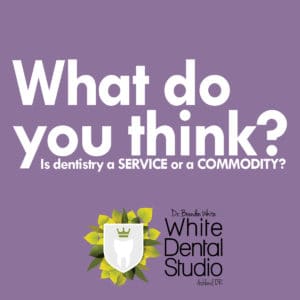 We change people’s lives through dental health if you think about it. Whether improving someone whose health is suffering from pain, infection, or missing teeth to restoring a smile lost from an accident, decay, or otherwise, it has a profound effect. I have had patients come back after these life changing experiences and say their family members cried when they saw them smile a big, genuine smile for the first time in years. Dentistry is a combination of biologic understanding mixed with artistry, finesse, technology, communication, and trust. It should continue to remain this way.
We change people’s lives through dental health if you think about it. Whether improving someone whose health is suffering from pain, infection, or missing teeth to restoring a smile lost from an accident, decay, or otherwise, it has a profound effect. I have had patients come back after these life changing experiences and say their family members cried when they saw them smile a big, genuine smile for the first time in years. Dentistry is a combination of biologic understanding mixed with artistry, finesse, technology, communication, and trust. It should continue to remain this way.
Big business has found its way into dentistry, much like it has for our medical colleagues. This is driven by two factors in my mind. The first is that students no longer graduate with debt that is manageable, so they need an instant steady income. The American Student Dental Association estimates the average dental school senior graduates with over $287,000 in debt in 2017. Corporate chain practices offer steeply discounted, high volume dentistry where an employee dentist can have a guaranteed wage and an incentive bonus to produce more. These Dental Service Organizations have funding and investment roots often times well outside of the local area and typically use their size to negotiate contracts with insurers, suppliers, labs, and marketing at the cost of a more frequent doctor/staff turn over rate which results in doctor-patient relationships formed more on the commodity of getting a patient through for their work and less on the service of forming long-standing relationships. The reality in many of these scenarios is the doctor is working for someone higher up influencing how they diagnose, treatment plan, and perform dentistry such that the corporation meets its goals to provide a return to investors.
The second driving factor is the reduction of choice via the insurance industry. Individuals purchasing insurance personally do not have access to the same plans groups have, while both individuals and groups are being steered towards the PPO (Preferred Provider) network. This reduces out of pocket expense for the patient as well as insurance payment from the insurer as the doctor “In-Network” has agreed to take often times a 30-40% (or even more) reduction in compensation to provide services to these groups. The resultant effect is a cascading one as, in order to remain in business, costs have to be managed to accept this reduced compensation while cash paying patients are left scratching their heads at why they pay so much more. Often times this comes in the form of lower cost materials which don’t always perform as well, lower cost labs, deferral of updating facilities, and offering lesser compensation to doctors and staff.
What does the consumer pay in this evolving model? Is the level of service the same? Is the quality the same? Is the relationship of trust established when the doctor turn-over is high? If the commodity of dentistry in order to save a little here and there is worth a change in the system, then maybe it is time to embrace it. But, if your mindset is similar to mine where individualized care, unbound by insurance restrictions and the expectations of a corporate bureaucracy, is important then please don’t embrace this corporate model of dentistry. I strong recommend as a dental professional to please continue supporting your local, independent dental practices.
Written by: Dr. Brandon White, DDS owner/dentist at White Dental Studio in Ashland, OR
Take a gander at these recent blog posts by Dr. White:
The 5 Developments I’m Thankful For in Modern Dentistry
Why is Tooth Enamel So Important?
What Are You Looking For in a Dentist?

Recent Comments